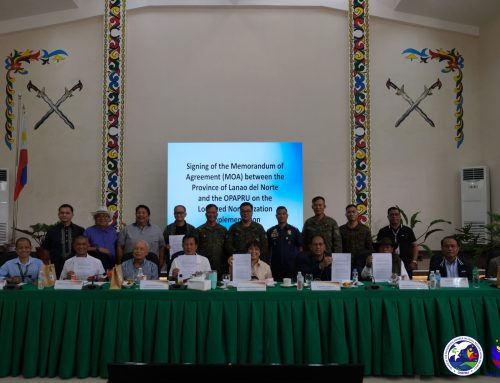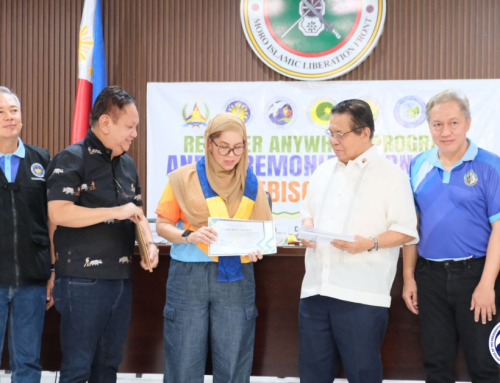PASIG CITY — The COVID-19 pandemic has not stopped the national and Bangsamoro governments from implementing all components under the Normalization track of the Bangsamoro peace process, particularly the socioeconomic interventions which aim to uplift the lives of decommissioned Moro Islamic Liberation Front (MILF) combatants, their families, and other members of their communities.
“Amid the challenges we face during this pandemic, the national and Bangsamoro governments are working hand in hand in carrying out initiatives to improve the welfare of our MILF brothers and sisters using a whole-of-government approach,” Presidential Peace Adviser Carlito G. Galvez, Jr said.
“The implementation of these measures under the Comprehensive Agreement on the Bangsamoro (CAB) is a joint responsibility of our governments. It is this ‘jointness’ which makes the relationship between our governments special. This is why we are focused on further strengthening this partnership, as we adapt to the ‘new normal,” Galvez added.
The Normalization Track has four components. These are 1) security (2) socio-economic development, (3) confidence-building measures, and (4) transitional justice and reconciliation.
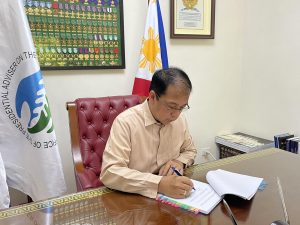
Collaborative efforts for meaningful transformation in the Bangsamoro
On Tuesday (April 27), the Office of the Presidential Adviser on the Peace Process (OPAPP) and the Bangsamoro Autonomous Region in Muslim Mindanao’s (BARMM) Ministry of Basic, Higher, and Technical Education (MBHTE) have forged a Memorandum of Agreement for the implementation of PhP 146.8 million worth of education programs in the BARMM.
These include the PhP 56.5 million Bangsamoro Grants-In-Aid Higher Education Program (BGIAHEP) and the PhP 90.3 Million Alternative Learning System (ALS) Program for decommissioned combatants (DCs) and their dependents, including selected residents from the six previously recognized MILF camps.
Under the MOA, OPAPP shall provide funds amounting to PhP 146.8 directly to the BARMM upon the signing of the agreement and the completion of pre-project implementation documentary requirements.
According to Ariel Hernandez, co-chair of the Joint Normalization Committee (JNC), the provision of these funds to the Bangsamoro government “is a testament of the national government’s commitment to the full implementation of the normalization track.”
BARMM Chief Minister Ahod Balawag Ebrahim and MBHTE Minister Mohagher signed the MOA last April 19 on behalf of the BARMM government, while Galvez and OPAPP Undersecretary David Diciano, who is also the Chair of the Government Implementing Panel signed the agreement on behalf of the national government.
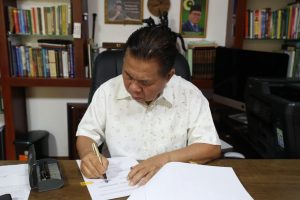
Under the MOA, MBHTE has committed to provide assistance to higher education institutions (HEIs) and government agencies to ensure accessible quality education in the BARMM.
Diciano stressed that the GPH Peace Implementing Panel, together with its peace partners, “must continue to work relentlessly to deliver all commitments under the CAB.”
“The implementation of the educational assistance through the BARMM MBHTE is just one of the many follow-through interventions that we have implemented for the decommissioned combatants after they received the transitional cash assistance amounting to PhP 100,000 each,” he added.
OPAPP and the MBHTE will determine the program beneficiaries and target areas for the said education projects.
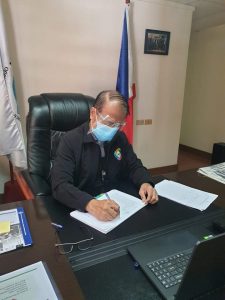
The BGIAHEP is among the key programs to be rolled out in support of peacebuilding efforts in the Bangsamoro.
BGIAHEP is a comprehensive package of benefits which include a subsidy for tuition and other school fees for semester and summer classes, monthly stipend, book allowance, and learning support, among others.
The ALS, on the other hand, is among the programs that have been identified under the framework of socioeconomic development for DCs and their communities, and for other members of the community of the six recognized MILF camps.
This intervention falls under the socio-enonomic component of the Normalization track.
Other interventions include a Livelihood and Employment Assistance program in collaboration with the Department of Trade and Industry (DTI); a Livelihood Emergency Employment Program in partnership with the Department of Labor and Employment (DOLE); a Virtual Transformation Training with the Bangsamoro Development Agency (BDA); construction of rural health clinics in collaboration with the Department of Health (DOH) and the Ministry of Health (MOH); and the rehabilitation of irrigation systems in partnership with the National Irrigation Administration (NIA).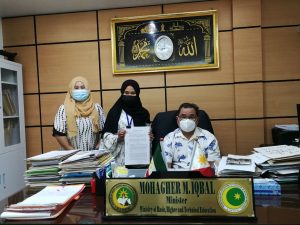
On top of these, the Camps Transformation Plan (CTP) Composite Team also turned over the Camps Transformation Plan (CTP) to the Joint Task Force Camps Transformation (JTFCT) early this year.
The plan contains the programs and projects to be implemented in the six government-acknowledged camps based on the recommendations coming from the MILF members themselves.
Gains of other components of Normalization Track
The national and Bangsamoro governments, through the GPH-MILF Peace Implementing Panels, continue to carry out cross-cutting measures that are helping former combatants and their families make the transition to mainstream society, while ensuring peace and security in the region.
After providing each of the 12,145 decommissioned MILF combatants with PhP 100,000 each in financial assistance, the GPH-MILF panels, together with its institutional partners, are currently in the different stages of implementing socioeconomic interventions in beneficiary communities.
According to OPAPP Dir. Wendell Orbeso, head of the government’s Joint Normalization Committee (JNC) Secretariat and the CAB Implementation Department, the JNC, through the Inter-Cabinet Cluster Mechanism (ICCMN), has been looking for ways to pool much-needed government resources in order to implement these programs in Bangsamoro communities.
“Despite the challenges we are facing now, our relations with our institutional partners has continued to strengthen as we transition to the ‘new normal.’ Our partners are fully committed to supporting our programs and agree that these measures must be carried out using a holistic and integrated approach,” Orbeso said.
For the security component, the GPH-MILF’s Joint Peace and Security Committee continue to activate and deploy Joint Peace and Security (JPST) teams in areas mutually agreed by the GPH and MILF peace panels. To date, 10 JPSTs have been deployed in areas across the Bangsamoro.
During the recent turnover of a JPST station in Maguindanao, Hernandez told the JPST members that “it (JPST) is a very unique arrangement and first in the world na may police, may army at may MILF na isang team. And because of this unique arrangement and a very good relationship, we don’t have a doubt that it will work well and be a very important tool in promoting peace and security [in the Bangsamoro].”
The National Task Force for the Disbandment of Private Armed Groups (NTF DPAGs) has spearheaded the disbanding of six private armed groups operating in Mindanao.
On confidence building, an Amnesty Program will be rolled out for MILF members who committed crimes in connection to their political armed struggle. The House of Representatives Committees on Justice and National Defense and Security recently concurred in the Amnesty Proclamation issued by President Duterte. The plenary of the Lower House and, eventually, the Senate will soon tackle their concurrence to this proclamation.
For the transitional justice and reconciliation component, the ICCMN has approved the proposed Transitional Justice and Reconciliation (TJR) roadmap, which is a key component of the normalization track of the CAB.
OPAPP Assistant Secretary Atty. Wilben Mayor underscored that the TJR roadmap “is a living document that is intended to guide government programs and interventions on TJR and a set of deliverables that can realistically be started and achieved within the Duterte administration.”
“Through the implementation of these initiatives, the Duterte Administration is demonstrating its steadfast support to the Bangsamoro peace process by fulfilling its commitments under the CAB, and helping build a brighter future for the Bangsamoro people,” Galvez said. ###



